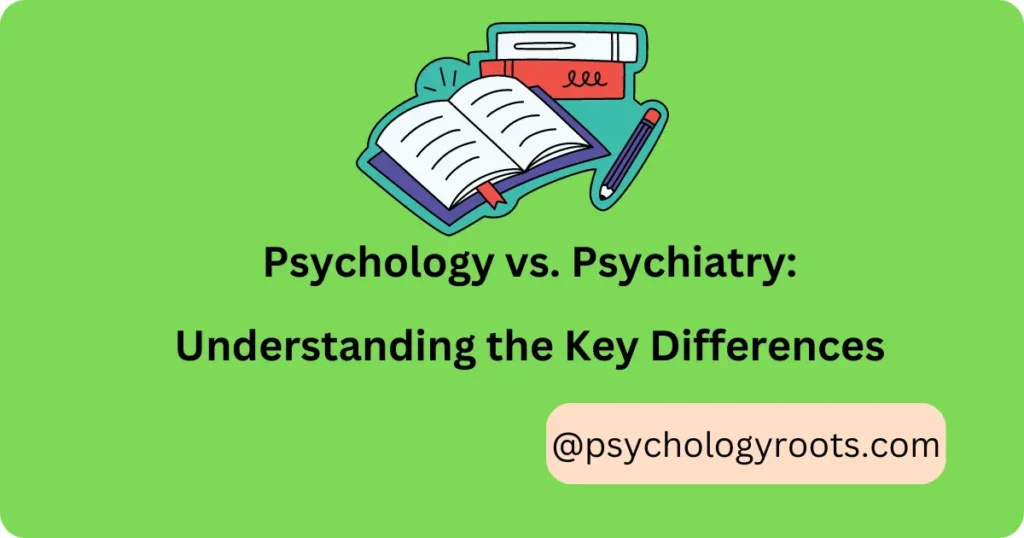Table of Contents
Psychology vs. Psychiatry: Understanding the Key Differences
When it comes to mental health care, two professions that often get confused are psychology and psychiatry. While both fields deal with mental health and aim to improve emotional and behavioral well-being, they have distinct differences in their approaches, training, and methods of treatment. In this post, we’ll explore what sets psychology apart from psychiatry, helping you understand which one might be right for you depending on your needs.
What is Psychology?
Psychology is the scientific study of the mind and behavior. Psychologists focus on understanding the human mind, emotions, thought processes, and actions. They are trained in various psychological theories and therapeutic techniques aimed at helping individuals deal with emotional and behavioral challenges.
Psychologists may work in different areas such as clinical psychology, counseling, educational psychology, and more, using talk therapy and other non-medical treatments to help their clients manage mental health issues.
What is Psychiatry?
Psychiatry, on the other hand, is a branch of medicine focused on diagnosing, treating, and preventing mental illnesses. Psychiatrists are medical doctors who specialize in mental health disorders and are able to prescribe medications as part of treatment. Psychiatrists often treat more severe mental health conditions such as schizophrenia, bipolar disorder, and major depression using a combination of medication and therapy.

Education and Training
The educational paths for psychologists and psychiatrists are quite different, though both require years of extensive training.
Psychologists typically earn a Doctorate in Psychology (Ph.D. or Psy.D.). This requires completing undergraduate and graduate coursework, conducting research, and finishing supervised internships. Psychologists are trained in various therapeutic methods but do not attend medical school or prescribe medications (with some exceptions in certain U.S. states).
Psychiatrists are medical doctors with a Doctor of Medicine (M.D.) or Doctor of Osteopathic Medicine (D.O.). After completing medical school, psychiatrists undergo residency training in mental health, learning to diagnose and treat psychiatric disorders using medications, psychotherapy, and other treatments.
Scope of Practice
Psychologists:
- Focus on therapy and counseling
- Treat emotional, social, and behavioral problems
- Use talk therapy (e.g., Cognitive Behavioral Therapy, Psychoanalysis)
- Work in a variety of settings, including schools, hospitals, private practice, and research
- Do not prescribe medication (with a few state-specific exceptions in the U.S.)
Psychiatrists:
- Focus on diagnosing and treating mental illness through a medical approach
- Can prescribe medication to manage mental disorders
- May offer treatments like electroconvulsive therapy (ECT) and deep brain stimulation (DBS)
- Work in hospitals, psychiatric clinics, and private practices
Approaches to Treatment
Psychologists and psychiatrists approach mental health treatment differently based on their training and philosophy.
- Psychologists primarily use psychotherapy to help clients explore their thoughts, feelings, and behaviors. Techniques such as Cognitive Behavioral Therapy (CBT), dialectical behavior therapy (DBT), and psychodynamic therapy are commonly used to treat conditions like anxiety, depression, and trauma.
- Psychiatrists often begin treatment with a biological approach, focusing on brain chemistry, medications, and the biological basis of mental illness. Psychiatrists frequently prescribe antidepressants, antipsychotics, mood stabilizers, and other medications as part of a comprehensive treatment plan. However, many psychiatrists also offer psychotherapy alongside medication.
Which Should You See?
When to See a Psychologist:
- If you’re dealing with emotional issues like stress, anxiety, or depression
- If you need help with behavioral problems such as addiction, relationship issues, or grief
- If you’re looking for talk therapy and long-term support without medication
When to See a Psychiatrist:
- If you have a severe mental illness such as schizophrenia, bipolar disorder, or major depression
- If you need medication management for mood disorders, anxiety, or psychosis
- If you require a medical diagnosis alongside therapy to manage complex mental health issues
Collaboration Between Psychologists and Psychiatrists
In many cases, psychologists and psychiatrists work together to provide comprehensive mental health care. A patient may see a psychiatrist for medication management and a psychologist for therapy. This collaborative approach ensures that all aspects of a patient’s mental health are addressed, from the biological to the emotional and behavioral.
Conclusion
While both psychology and psychiatry play critical roles in mental health care, they have distinct approaches, training, and treatment methods. Understanding the differences between the two can help you make informed decisions about your mental health needs. Whether you choose a psychologist for therapy or a psychiatrist for medication, both professionals share the same goal: to improve your mental well-being and help you live a balanced, healthy life.
Help Us Improve This Article
Have you discovered an inaccuracy? We put out great effort to give accurate and scientifically trustworthy information to our readers. Please notify us if you discover any typographical or grammatical errors.
Make a comment. We acknowledge and appreciate your efforts.
Share With Us
If you have any scale or any material related to psychology kindly share it with us at psychologyroots@gmail.com. We help others on behalf of you.